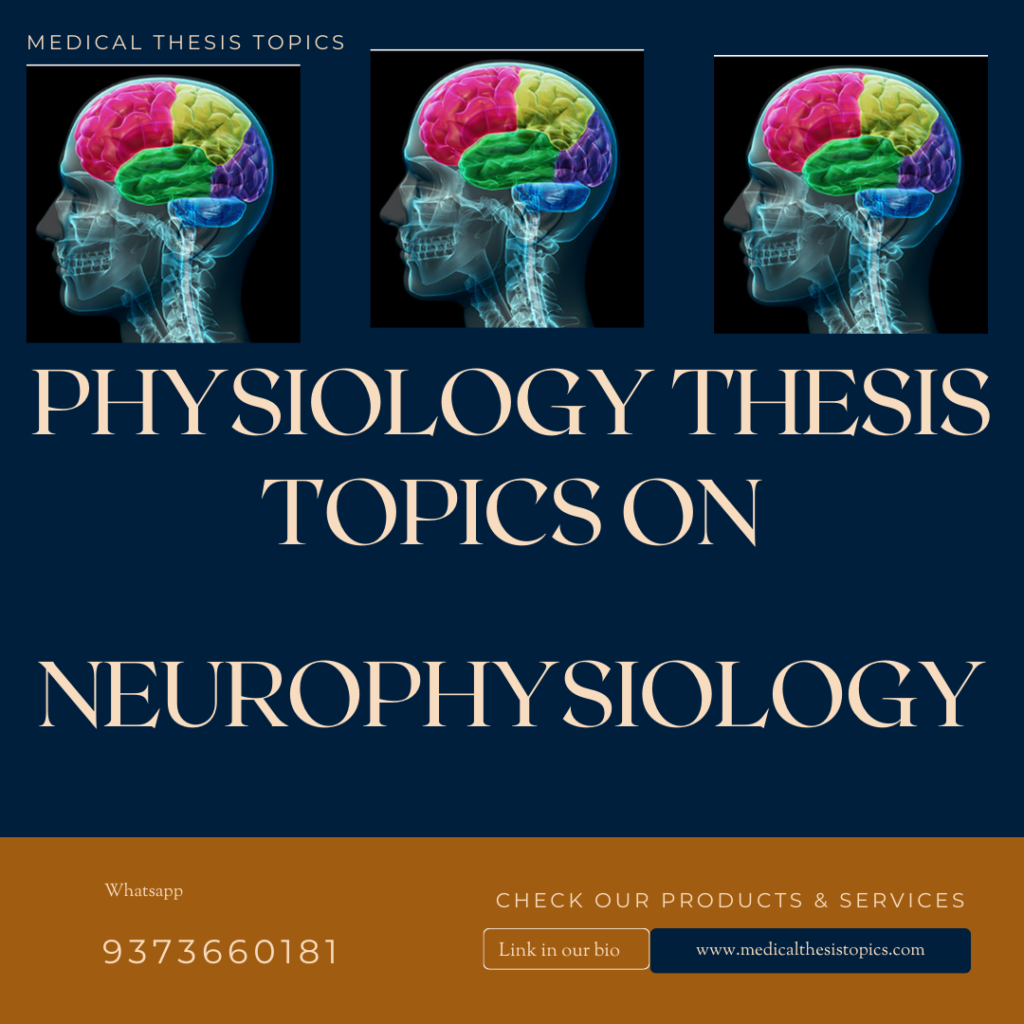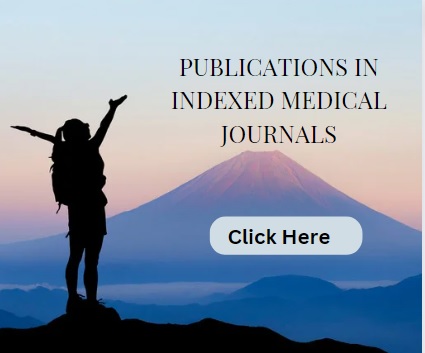PHYSIOLOGY Thesis Topics
Publications
Special Article
Research Topics

Physiology Thesis Topics For MD/DNB
Remember Subscribing to the premium thesis topics not only will enable you to browse through premium thesis topics but also you will get access to online guidance about synopsis writing, sample size calculation, inclusion and exclusion criteria and guidance throughout thesis writing. In case you dont subscribe still do not hesitate to contact me for guidance.
Choosing the right physiology thesis topics is a critical step for MD or DNB students aiming to excel in their academic research. The list of 100 free physiology thesis topics provided here serves as a valuable resource for students seeking innovative and relevant ideas for their research. From fundamental concepts to cutting-edge advancements, these physiology thesis topics offer a broad spectrum of choices to cater to various research interests.
Whether you’re interested in cellular physiology, human systems, or metabolic studies, this collection is designed to provide a strong foundation for a well-rounded thesis. Moreover, students who require even more specialized physiology thesis topics can take advantage of premium services that include over 2000+ additional topics, ensuring that you find the perfect match for your research goals.
For those aiming to stay updated with the latest research, premium physiology thesis topics are an excellent choice. These premium services offer not only a wide array of physiology thesis topics but also recent advancements published in leading national and international physiology journals.
This ensures that the topics you choose are timely and relevant, adding academic value to your work. Accessing such a vast repository of physiology thesis topics enhances the chances of selecting a unique and impactful thesis subject. Whether opting for free or premium physiology thesis topics, the key to success lies in choosing a topic that aligns with your research aspirations while also contributing to the wider field of physiology.
- Brainstem auditory evoked responses in essential hypertension.
- Comparative study of autonomic functions in normotensive and hypertensive subjects.
- A comparative study of autonomic functions in patients of hypothyroidism and hyperthroidism.
- A study to quantify the exercise stress in terms of oxygen consumption and anaerobic threshold in patients of suspected coronary artery disease during conventional treadmill testing.
- Is metabolic equivalent a good indicator of functional exercise capacity in adult asian indian patients of suspected coronary artery disease undergoing cardiac stress test (TMT) using bruce protocol.
- To study autonomic function status in subclinical hypothyroid patients.
- To study brain stem auditory evoked potential in patients with type II diabetes mellitus.
- Autonomic functions in normotensive subjects with family history of hypertension.
- Auditory evoked potentials in type II diabetes mellitus patients.
- Comparative study of serum lipid profile in premenopausal and postmeno-pausal women.
- Study of correlation of body mass index, blood pressure and lipid profile in type- II diabetes and healthy individuals.
- Influence of age and gender on cold pressor test response in adults.
- Assessment of auditory and visual reaction time in type 2 diabetics.
- Correlation between hypertension and anthropometric variables in adult men above 30 years.
- Effect of sleep deprivation on human postural control,audio-visual reaction time and eye hand co-ordination.
- To evaluate taste sensitivity to phenylthiocarbamide in smokers and non-smokers.
- Influence of anthropometric indices and exercise on pulmonary function tests in young individuals
- Effect of pregnancy and labour on maternal oxygen saturation
- Detection of Primary Hypertension in Adolescent Group
- Prehypertension – prevalence and risk factors in young individuals – a study
- Influence of hasya yoga on type 2 diabetics with chronic stress
- The effect of solid and liquid meal on post-prandial portal vein flow
- Correlation of physical activity and metabolic syndrome in young adults
- Heart rate variability and glycemic control in type ii diabetes mellitus
- Puretone audiometry in industrial workers
- Study of pulmonary functions in chronic renal failure and the effect of hemodialysis on it
- Trends of intraocular pressure in different status of women
- Heart rate variability and Lipid profile in women with Polycystic Ovary Syndrome
- Sensory nerve conduction studies in Diabetes mellitus
- Randomized controlled study on the effect of hatha yoga on post myocardial infarction patients with coronary artery disease
- A study to assess the extent of autonomic dysfunction based on standard cardiovascular tests, in different grades of alcoholics
- Cardiovascular Indices of Autonomic Functions in End Stage Renal Disease Patients Pre and Post Dialysis
- Effects of obesity on the heart rate variability
- Heart rate variability in postmenopausal women co-related with estradiol assay
- Heart rate variability in hyperthyroid patients correlated with thyroid function tests
- Prevalence of refractive error among the anaemic and non-anaemic first MBBS students
- Lung functions in Non Insulin dependent Diabetes Mellitus in Male subjects without history of respiratory disorders.
- Study of Auditory and Visual reaction time in premenstrual and post menstrual phase.
- Prevalence of obesity in young Indian adults aged between 17 to 22 years and relation of obesity with lipid profile
- Lung Function tests in Air- Conditioner users.
- Examination stress and its correlation with blood pressure, pulse and lipid profile
- Estimation of serum Ca, Mg & Pi levels during different phases of Menstrual cycle
- Assessment of incidence of obesity in 1st yr. M.B.B.S. students aged 18-23 yrs & its relation with Cardiopulmonary Efficiency.
- A study of cardiopulmonary efficiency in physically trained and untrained subjects
- Autonomic function tests in type II Diabetes mellitus male patients.
- To correlate the body fat percentage with autonomic nervous system activity in post menopausal women.
- A study of pulmonary functions in spray painters working in automobile garage.
- Autonomic functions in hypertensive and Hypertensive diabetic subjects
- Study of the normative changes in auditory brainstem response in infants.
- A study of autonomic functions in normotensive offspring with a genetic predisposition to essential hypertension.
- A study of tactile sensation and memory in blind and sighted individuals.
- A study of the effect of nutritional status on heart rate variabilities and skeletal muscle endurance in young adults.
- Effect of music on exercise induced sympathetic dominance, assessed by autonomic function tests.
- A study of autonomic functions in patients of bronchial asthma.
- Effect of obesity reduction on pulmonary function test.
- Effect of smoking on autonomic functions and pulmonary function tests.
- A study of Heart Rate Variability &Inflammatory markers in Subclinical Hypothyroidism.
- A comparative study of cardiac autonomic functions in practitioners of yoga, trained athletes and individuals of sedentary lifestyle.
- Assessment of Cognitive Functions in Sleep Deprived Residents and Interns
- A comparative study to analyse gender differences in nerve conduction parameters of upper limb nerves in healthy adults
- Study of Neutrophil to Lymphocyte ratio and platelet to Lymphocyte ratio in Hypertensive and Normotensives.
- Influence of Physiological Factors and Posture induced changes in H-reflex study variables.
- To Study the effect of long working hours on nerve conduction velocity in chronic computer operators.
- Effect of weekly oral iron supplementation on cognitive functions in anaemic late adolescent girls.
- Sural nerve conduction studies in type 2 Diabetes Mellitus patients with clinically undetectable peripheral neuropathy.
- Sleep deprivation and visual evoked potential changes in rotational shift workers.
- A study of peripheral nervous system alterations in autoimmune disorder patients
- ECG as a diagnostic tool for electrolyte imbalance in hemodialysis patients of Chronic Kidney Disease.
- Effects of salt deprivation and calcium load on the blood pressure.
- Comparative analysis of the uterine menstrual cycle and the hematological indices of adolescents.
- Normal electrolyte values in an adult Indian population.
- Effect of dietary habits, disease patterns and psychological stress on known essential hypertensive patients.
- Effect of Ph on human erythrocyte shape.
- Plasma fibrinogen studies in diabetes mellitus.
- Plasma ascorbic acid levels of pregnant women in a rural area.
- Serum proteins in protein-energy malnutrition.
- Arm blood flow and anti-diabetic drugs in men.
- lactose intolerance in adolescent girls.
- The effect of pollution on the nutritional status of pre-school children.
- The assessment of nutritional status of pre-school children in emohua village.
- A study of peripheal nervous system alterations in diabetes mellitus patients.
- Effect of cigarette smoking on lung functions.
- Effect of salt loading on blood sodium and potassium levels in males and females
- Influence of haemoglobin genotype on normal blood rheology.
- Effects of temperature and exercise on limb blood flow in man.
- Heights, weights, blood pressure, pulse, body surface area, respiratory rates in nigerian pupils of primary school age.
- Serum and urinary levels of sodium and potassium in a normal adult Indian population.
- Blood flow in normal nigerians and patients with diabetes mellitus.
- Estimation of basal metabolic rate (BMR) of adult females in port harcourt.
- Blood pressure changes during the menstrual cycle.
- Effect of plantain (musa paradisiaca) on rabbit intestinal motility.
- Effect of haemoglobin genotype on exercise tolerance.
- Normal serum calcium levels in random samples of adults in a Indian population.
- The effect of palm wine on gastric acid secrete
- An evaluation of the measurement of the specific gravity of blood as a screening test for blood donors.
- Incidence of colour blindness among university students in Indian rural population.
- Red blood cell count, packed cell volume and haemoglobin concentration in normal males.
- Creatinine clearance in pregnancy normalized to lean body mass.
- A study of peripheal nervous system alterations in Hypothyroid patients.
- Evaluation of autonomic and pulmonary functions in cervical compressive myelopathies.
- Physiological Changes in blood pressure during pregnancy.
Recent Physiology Thesis Topics (2024)
Ø “Comparative Study of Cardiovascular Responses to Exercise in Trained and Untrained Individuals: A Cross-Sectional Study”
Ø “A Study on the Role of Oxidative Stress in Hypertensive and Normotensive Individuals: A Biochemical and Physiological Analysis”
Ø “The Effect of Yoga on Pulmonary Function in Patients with Chronic Obstructive Pulmonary Disease (COPD): A Randomized Controlled Trial”
Ø “Electrophysiological Study of Nerve Conduction in Diabetic Neuropathy Patients: A Comparative Study of Type 1 and Type 2 Diabetes”
Ø “A Study on the Effect of Circadian Rhythms on Cognitive Performance in Shift Workers: A Cross-Sectional Analysis”
Ø “Heart Rate Variability as a Marker of Autonomic Dysfunction in Patients with Metabolic Syndrome: A Case-Control Study”
Ø “A Study on the Role of Vitamin D in Muscle Strength and Endurance: A Comparative Study in Vitamin D Deficient and Sufficient Individuals”
Ø “Impact of Hyperglycemia on Pulmonary Function: A Comparative Study of Diabetic and Non-Diabetic Individuals”
Ø “The Effect of Prolonged Screen Exposure on Visual Acuity and Eye Fatigue: A Cross-Sectional Study in Young Adults”
Ø “Comparative Study of Resting Metabolic Rate and Body Composition in Obese and Non-Obese Individuals”
Ø “A Study on the Impact of High-Altitude Hypoxia on Respiratory Function in Military Personnel: A Longitudinal Study”
Ø “The Effect of Chronic Stress on Salivary Cortisol Levels and Sleep Patterns in Medical Students: A Cross-Sectional Study”
Ø “Impact of Aerobic Exercise on Glycemic Control and Insulin Sensitivity in Patients with Type 2 Diabetes Mellitus: A Randomized Controlled Trial”
Ø “A Comparative Study of Brainstem Auditory Evoked Potentials in Smokers and Non-Smokers”
Ø “Influence of Menstrual Cycle Phases on Cognitive Functions and Reaction Time in Women: A Cross-Sectional Study”
Ø “Effect of Cold Exposure on Cardiovascular and Respiratory Parameters in Healthy Volunteers: A Physiological Study”
Ø “A Study on Sleep Deprivation and Its Effect on Cognitive Functions in Resident Doctors: A Cross-Sectional Analysis”
Ø “The Role of Antioxidant Supplementation in Reducing Exercise-Induced Oxidative Stress: A Randomized Controlled Study”
Ø “The Effect of Intermittent Fasting on Lipid Profile and Blood Glucose Levels in Healthy Individuals: A Longitudinal Study”
Ø “A Study on the Variability of Heart Rate and Blood Pressure Responses to Orthostatic Stress in Different Age Groups”
Ø “Influence of Caffeine Consumption on Cognitive Performance and Stress Response in College Students: A Comparative Study”
Ø “Impact of Meditation on Cortisol Levels and Autonomic Nervous System Function: A Randomized Controlled Trial”
Ø “Comparative Study of Pulmonary Function and Exercise Tolerance in Asthmatic and Non-Asthmatic Children”
Ø “A Study on the Impact of Obstructive Sleep Apnea on Cardiovascular Health: A Cross-Sectional Study Using Polysomnography”







